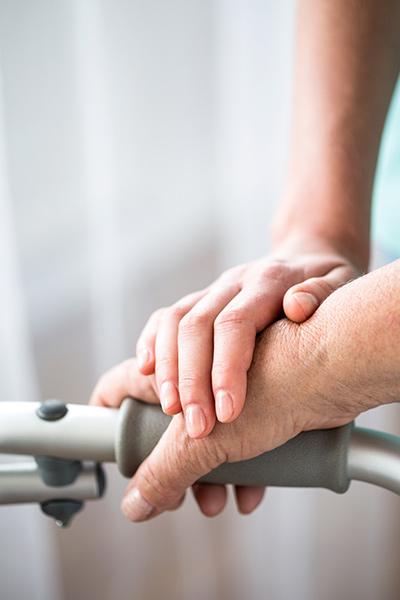
If you provide care for a loved one with cancer, you may find that you need assistance with the different tasks and responsibilities that come with the role. You’re not alone! This is common among caregivers. 
Many people feel that asking for help is a sign of weakness. It’s not. Finding help is a sign of wisdom and strength. It ensures that the person diagnosed with cancer continues to receive high-quality care while you maintain your health and well-being.
Consider the airplane oxygen mask analogy. “In the event of an emergency, put on your own oxygen mask before assisting others.” In order to best support your loved ones, you need to make sure you’re able to provide that care. In some cases, this means exploring other caregiving options to help meet all of their different needs. A new arrangement may give you and your loved one the resources needed to improve well-being amid the challenges.
Consider professional caregivers
If possible, it may be beneficial to hire 1 or more of these professionals.
Medical professionals. They typically help with medical responsibilities that families can’t perform or aren’t comfortable performing.
-
Registered oncology nurses provide wound care, deliver chemotherapy, give nutrition advice, and manage pain.
-
Physical therapists and occupational therapists provide assistance with rehabilitation. Physical therapists treat conditions or injuries that affect a person’s ability to move around. Occupational therapists teach ways to do daily tasks that are more difficult after an illness or injury.
-
Hospice professionals provide physical, emotional, social, and spiritual support for people with advanced cancer and their families. Patients may receive this type of care at home, an inpatient hospice center, a nursing home, or another type of medical facility.
Non medical professionals. Home care aides help with everyday caregiving tasks, such as bathing, grooming, cooking, cleaning, and running errands. Sometimes, they’re called home care companions or personal attendants. They can also handle less complex medical issues, like checking a person’s temperature and blood pressure.
Ask the patient’s health insurance company whether it covers these services. Also, ask your social worker, nurse, or doctor for referrals to find these types of professional help.
Find community resources
Many communities have a wide range of resources for caregivers. These services meet needs beyond medical and physical care.
Case management. Trained case managers help coordinate home care, transportation, and meals. In fact, some patients may receive these services for free, based on eligibility requirements.
Legal aid. Local legal organizations may provide assistance with legal issues, such as advance directives. An advance directive is a legal document that tells the family and health care team who will speak for the patient if he or she is too sick to make decisions. It also provides information about the types of care that patient wants if he or she becomes too sick to speak for themselves.
Financial assistance and counseling. Local agencies may be able to help you and the person with cancer manage financial issues related to cancer treatment. Check out this list of financial resources.
Food delivery. Some for-profit and nonprofit organizations deliver healthy meals to homes.
Again, ask your social worker, nurse, doctor, or other health care team member for referrals in your specific area. Or, talk with members of local or online support groups and state or county health agencies.
Ask friends and family for help
Make a list of people who could help with specific caregiving tasks. The list could include emergency contacts, close friends and relatives, neighbors, and members of a religious community.
Now, jump over this common hurdle—fear of asking for help. Many people are often willing to provide help but aren't sure whether you want or need it. Ask for the help you need.
To foster healthy teamwork, be specific about the type of help you need, including when and how often, and work together to set expectations. Consider using an online tool or group email to help schedule caregiving tasks for a community of people.
